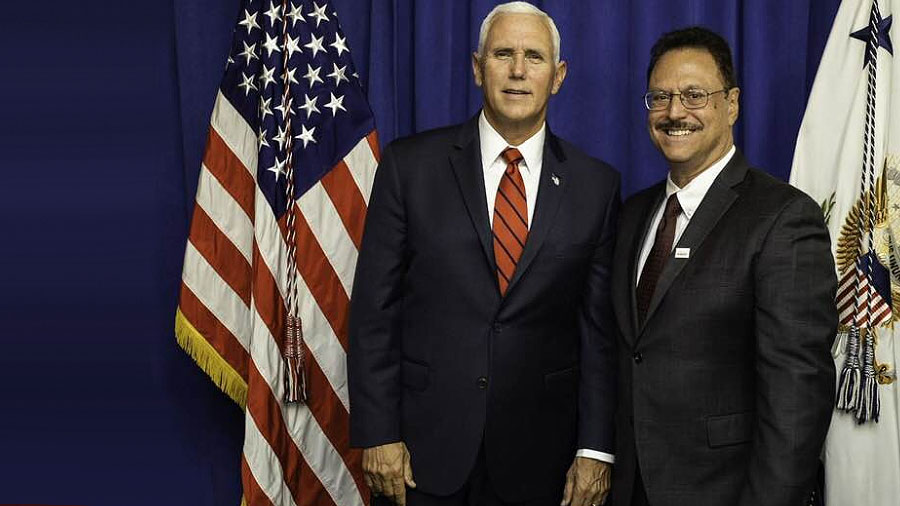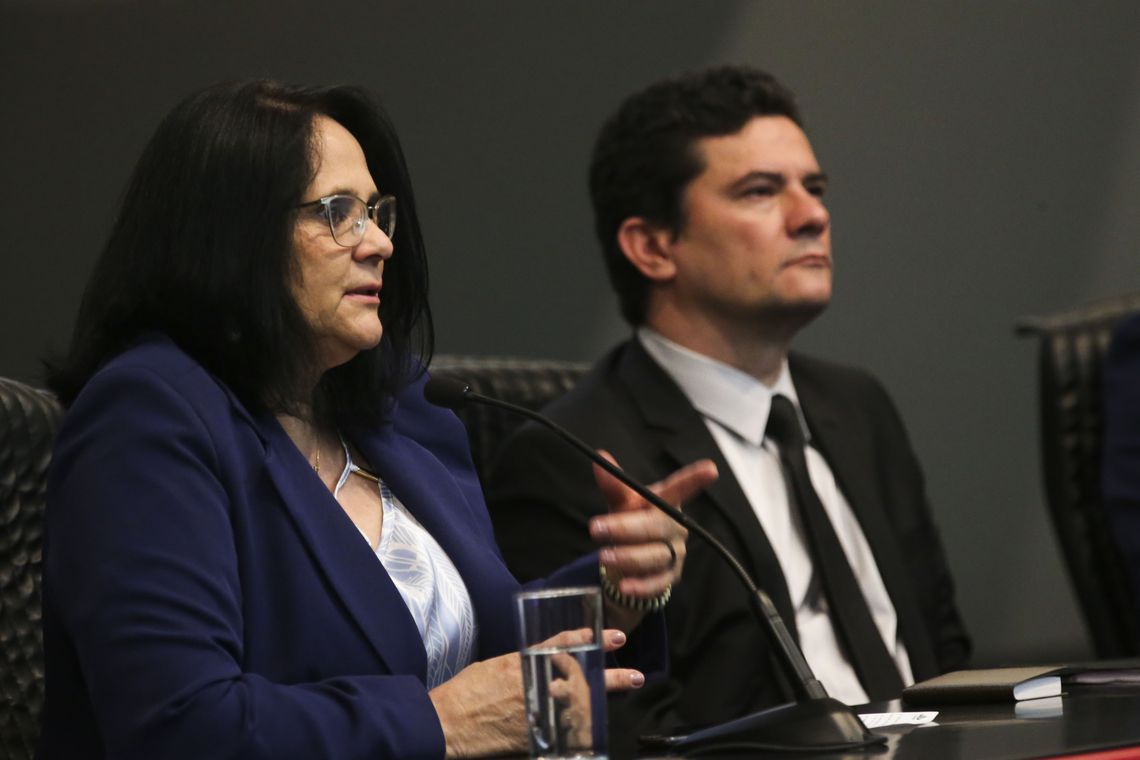American President Donald Trump was under a storm of criticism for his policy of separating migrant families at the border when Honduran President Juan Orlando Hernández –whose country is the second-largest source of Central American migrants to the US- was welcomed as a strategic ally to the White House in June last year.
Official press releases documented meetings with American Vice President Mike Pence and Secretary of State Mike Pompeo in which the migrant crisis and the situation of undocumented Hondurans were discussed extensively.
No official account mentioned the parallel talks Pence, Pompeo and a group of fundamentalist evangelical leaders held with President Hernández to persuade him to make state decisions based on their literal interpretations of the Bible.
On one hand, Pence and Pompeo – both evangelical Christians – used the official visit to convince President Hernández to let Capitol Ministries, a religious organization sponsored by both senior Trump administration officials, to introduce bible studies in Honduras. The ministries tout their program as efforts to “evangelize world political leaders” with the aim of aligning their agendas with their biblical principles.
The extent of that influence is noted in a statement that Capitol Ministries released when its founder, Ralph Kim Drollinger inaugurated the Bible studies in the Honduran Congress with Hernández, five months after the President’s visit to Washington. The press release confirms that two Cabinet members -Pence and Pompeo- “suggested to the president that he begin a ministry like the one they attend every week, and President Hernández took their suggestion to heart”.
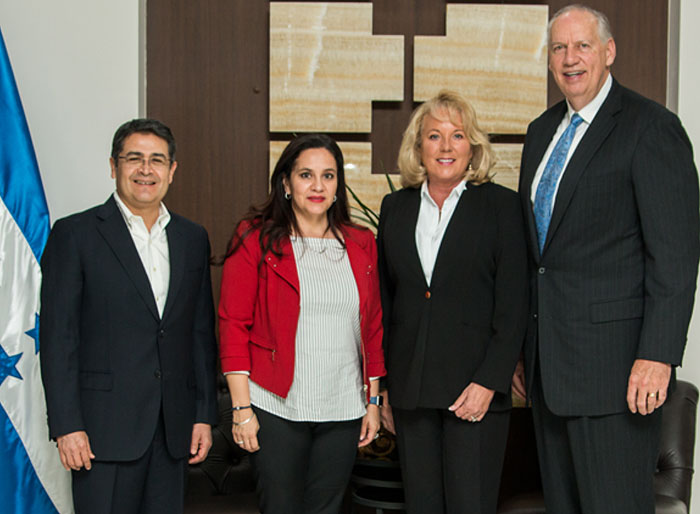
Drollinger is a spiritual mentor for Pence and Pompeo’s and has led the White House Bible studies since Pence invited him to set them up early in the Trump administration.
During the same visit to Washington, Hernández also met with five influential American evangelical leaders who are part of the White House Faith and Opportunity Initiative (WHFOI). The purpose of the meeting was to persuade the Honduran president to move his country’s diplomatic office from the Israeli capital of Tel Aviv to Jerusalem, Israel’s contested center of religious life. That goal, which included recognizing Jerusalem as the Israeli center of government, was confirmed by the meeting’s organizer, Mario Bramnick, in an interview with Columbia Journalism Investigations (CJI).
Bramnick is a Cuban-American pastor and founder of Latino Coalition for Israel (LCI), a Miami-based Christian Zionist organization that mobilizes political and religious leaders in Latin America to support Jerusalem as the religious and political locus of Israel.
Since 1947, the United Nations has issued several resolutions adopted by the majority of world nations recognizing the international status of Jerusalem and the need to create two separate states for Israelis and Palestinians, who have a longstanding dispute over the territory. That led all the world nations to locate their embassies in Tel Aviv, a tradition maintained until Trump relocated the US embassy to Jerusalem in May 2018.
The relocation of the US embassy was an electoral promise Trump made to the evangelical leaders as far back as his 2016 presidential campaign according to Bramnick. “President Trump promised and he delivered,” he said.
The pastor claims that, during the campaign, he also worked directly with the current White House Envoy to the Middle East, Jason Greenblatt, and current US Ambassador to Israel David Freedman to define American foreign policy toward Israel. “As soon as they were hired I met with them and we began to work on the Republican platform for Israel,” he said.
El pastor asegura que durante la campaña trabajó directamente con el enviado de la Casa Blanca para el Medio Oriente, Jason Greenblatt, y el actual embajador de Estados Unidos ante Israel, David Freedman, para definir la política exterior estadounidense frente a Israel.
“As soon as they were hired I met with them and we began to work on the Republican platform for Israel”, he said.
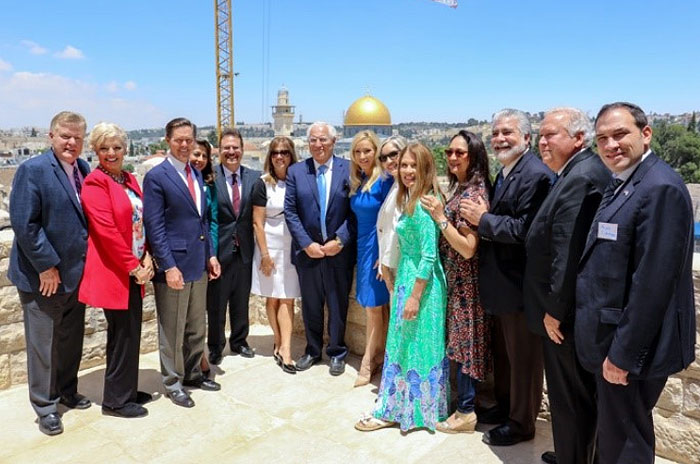
According to Bramnick, evangelical leaders’ work is inspired by spiritual principles. “We deal with governments so closely that the world thinks we are controlling politics, but for us it is spiritual, not political. The Bible says that whoever blesses Israel will be blessed and whoever curses Israel will be cursed, and we read the Bible literally. The Bible says Jerusalem is the eternal capital of Israel and that God gave this land to Abraham, Isaac and Jacob.”
The meetings of the evangelicals bore fruit. In March, Hernández announced that Honduras would recognize Jerusalem as the capital of Israel and the new home for his country’s commercial office.
Bramnick and the four evangelical leaders who met with Hernández are members of the White House Faith and Opportunity Initiative (WHFOI), an office established by Trump through an executive order in May last year.
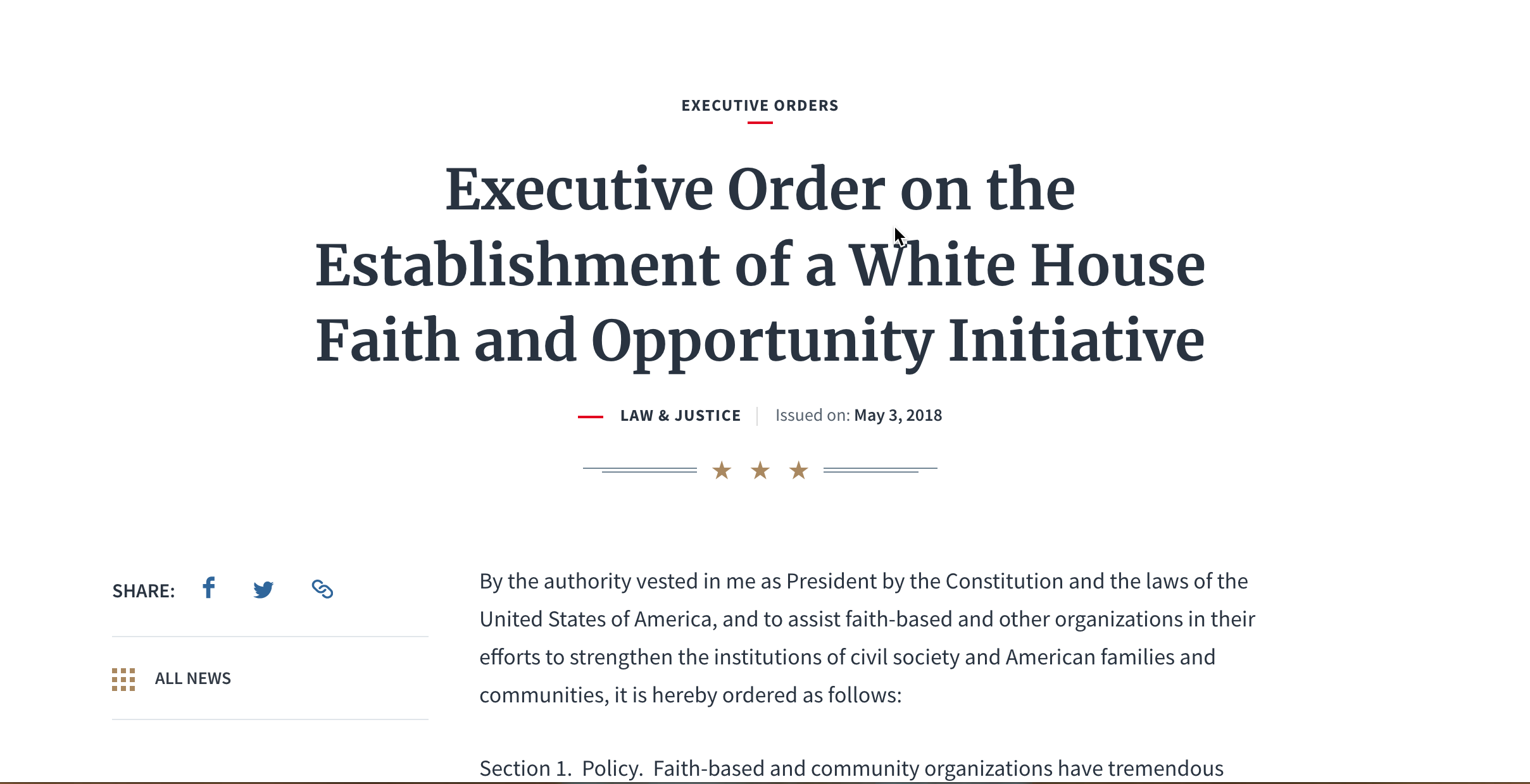
Bramnick confirmed he’s a member of this office and added: “The White House Faith Initiative invites national faith leaders to participate in various events like dinners, meetings, prayers and briefings with President Trump or Vice President Pence, depending on the subject.”
The pastor insisted that he set the meeting with the Honduran president in his capacity as president of the Latino Coalition for Israel (LCI) and not on behalf of the White House. But the day of the meeting, he posted a picture with Hernández on his Facebook profile, describing the delegation he led as endorsed by the White House. (The original text was erased from his Facebook post after his interview with CJI, but CJI saved a copy of the original version).
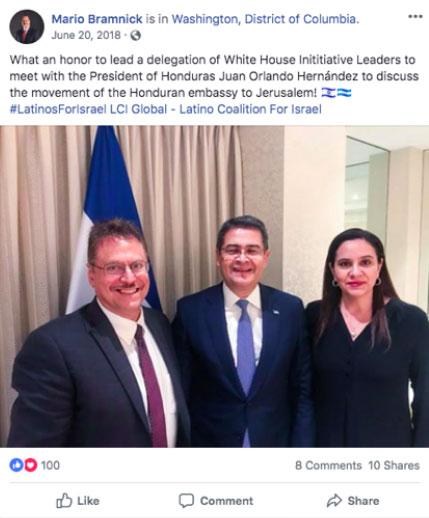
On May 16, 55 Palestinians were killed during the protests in Gaza while Trump’s daughter and son-in-law, Ivanka Trump and Jared Kushner, led the sped-up inauguration of the US embassy in Jerusalem. They were joined by Israeli Prime Minister Benjamin Netanyahu, leaders of the White House Faith and Opportunity Initiative and their wives.
Since the creation of the Faith Initiative, Trump and the evangelical leaders have kept a low profile, declining to answer questions from the press and advocacy groups regarding its operations, budget and appointments.
This collaborative investigation reviewed social media publications, videos and newsletters posted by the leaders of Trump’s evangelical advisory board during his electoral campaign and by their organizations. Since May last year, at least 18 of them, all of them evangelicals, identified themselves as part of the White House faith group during multiple public events across the world. Evangelicals represent a minority in the spectrum of faiths practiced in the US and protected by the First Amendment of the Constitution.
The group represents different theologies within the evangelical community, with some members adhering to more than one. Many preach the prosperity gospel, which sees economic growth and good health as blessings awarded to those who obey God and contribute money to the cause. Others are Christian Zionists, who believe in apocalyptic prophecies of Jesus’ return to Earth in Israel. A third group is comprised of leaders of the Southern Baptist Convention, the largest religious organization in the United States, with more than 50.000 churches in the country. The convention strongly opposes same-sex marriages.
Capitol Ministries, the White House Faith and Opportunities Initiative, and other evangelical leaders, aligning with many conservative Catholics, have fostered close connections to Christian political leaders in countries with large evangelical populations, including Guatemala, Honduras and Brazil. Those ties have extended to local politicians who have garnered considerable political power and influence in those countries.
In order to understand these alliances and their consequences, Columbia Journalism Investigations (CJI), the Latin American Center for Investigative Journalism (CLIP) and 15 investigative media outlets studied the activities of a group of US evangelical leaders and organizations and how they have garnered particularly strong support from the Trump administration to promote Christian fundamentalist policies and legislation in the highest circles of political power in Latin America. “”He [Trump] is the most – as many people have said – the most faith-friendly president that they have known in their lifetime,” said Paula White, Trump’s personal spiritual advisor and leader of the White House Faith and Opportunity Initiative to the Christian Broadcasting Network during the inauguration of the US Embassy in Jerusalem.
The evangelical leaders pledged their support for Trump at the start of the 2016 presidential campaign in exchange for promises of political favors that ranged from appointing conservative judges to the US Supreme Court to issuing policies against abortion and the rights of LGBTIQ to influencing American strategies in Israel.
Thanks to their White House ties, some of these leaders also have expanded their ministries in Latin America and built alliances with presidents with less than a perfect past.
Among them is Honduran leader who has not been indicted but has been investigated by the US Drug Enforcement Administration for “large scale” cocaine trafficking and money laundering, according to a 2015 US government report recently declassified.
Last August 2, a federal court in New York filed another document that identifies Honduran President as a co-conspirator in the international drug smuggling case against his brother, Tony Hernández. The President is not a defendant in the case, but prosecutors said $1.5 million in drug proceeds was used to help elect him in 2013. In a press release, the Honduran Presidency said the President is foe of traffickers who are out for revenge against him.
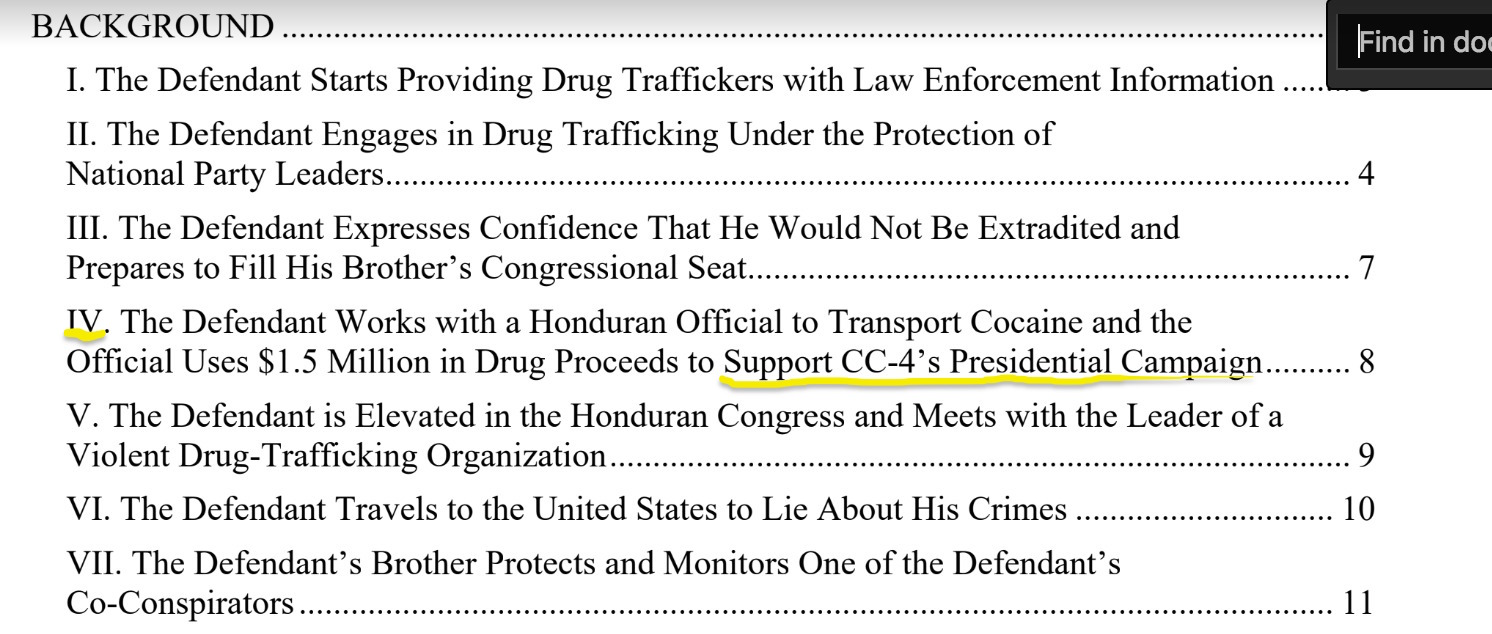
The export of religious missions from the US to Latin America, endorsed by the federal government, violates the principle of separation of church and state established in the US Constitution, according to Katherine Franke, Professor of Law, Gender, and Sexuality Studies at Columbia University in New York. Franke directs the school’s Center for Gender and Sexuality Law and is the faculty director of the Law, Rights, and Religion Project.
Franke said those efforts violated the Constitution by officially endorsing religion and by promoting specific beliefs.
“The government is actively promoting religion as an official government project and that clearly violates the establishment clause of the Constitution,” she said. “Even more than that, the government is promoting a particular religious view, not doing so evenhandedly and that’s a second kind of establishment clause violation.”
“Here,’ she added, “the government has clearly undertaken a singular promotion of religion with public money and with the name of the United States behind it and that is a clear violation of the establishment clause.”
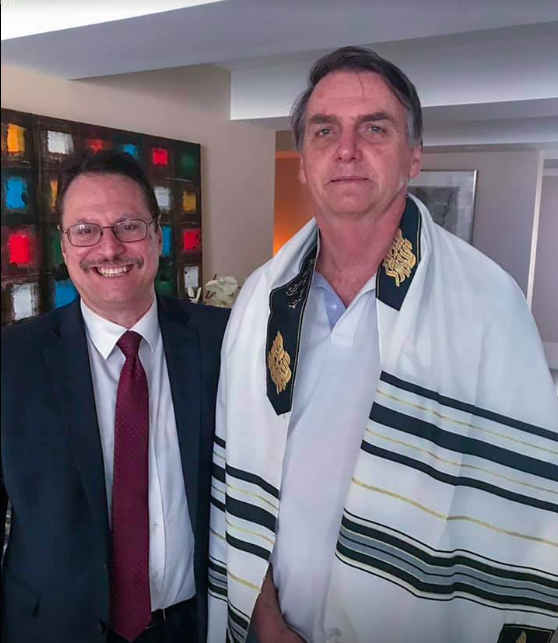
The religious leaders have also supported ultra conservative presidents such as Jair Bolsonaro in Brazil, who recently criticised a Brazilian Supreme Court Decision that criminalized homophobia. The Court ruled in June that homophobia is a crime, equivalent to racism. President Bolsonaro said the Court is “completely mistaken”. The decision, as Bolsonaro told Agenzia Brazil -the official governmental news agency- “harms the homosexuals because a businessman will think twice before hiring them since, if he makes a joke, he could be taken to court,” he said.
Bolsonaro said that if “there was an evangelical judge in the Supreme Court, such a decision would have never passed”.
In Sao Paulo alone, crimes against transgender people and homosexuals increased by 75 percent in August through October of 2018 during Bolsonaro’s electoral campaing, according to the newspaper Folha de Sao Paulo that analized Police data.
On July 31 Columbia Journalism Investigations sent separate emails with questions for this story to Pence, Pompeo, Drollinger and the Honduran President Juan Orlando Hernández. None of them responded.
The Cabinet’s pastor
Capitol Ministries was an organization in decay in the summer of 2009. Five of its directors had quit and accused the founder, Ralph Drollinger, of unethical behavior, “autocratic” leadership, financial irregularities and of “over spiritualizing situations for his own benefit, using Bible passages out of context to justify positions”.
Those allegations are included in a trademark lawsuit against Capitol Ministries filed in 2011 in the United States District Court for the Eastern District of North Carolina by Capital Commission, an organization founded by the directors who left Capitol Ministries. The lawsuit debated allegations of illegal use of Capitol Commission’s brand and it was settled in 2014.
The Cabinet’s pastor did not answer CJI’s questions for this article. But during the lawsuit he denied the claims against him and asserted that members of the church had breached his personal communications.
Following an internal investigation in 2009, Drollinger was expelled from his church, Grace Community Church in Sun Valley California. Thirty church leaders concluded that Drollinger was “disqualified for leading a spiritual ministry” and unanimously voted to rescind its support and affiliation with Capitol Ministries.
A near-fatal blow came when 16 of its 19 regional directors quit in October 2009. They founded Capitol Commission.
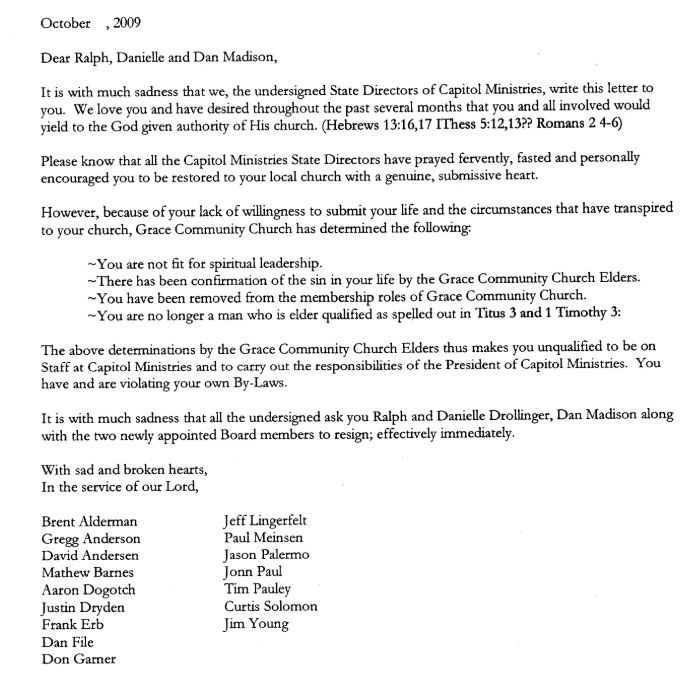
Weakened by the internal struggles, Drollinger traveled to Argentina in November 2009 to open his first overseas ministry, from which he recruited leaders from another eight Latin American countries. The project fell through and the group cut ties with the American pastor.
Yet Drollinger’s luck was about to change in 2016 with the onset of the American presidential elections.
Jeff Sessions – then US Senator and spiritual pupil of Drollinger who was soon to be appointed US attorney general – introduced the pastor by email to then-presidential candidate Trump and the pastor started sharing his Bible studies. “Trump has been writing notes back to me ever since, in a positive sense. He likes loyalty. I supported him from very early on in the campaign,” Drollinger recalled in an interview with German news outlet Die Welt in 2017.
The day after Trump wrapped up the Republican presidential nomination in July 2016, Drollinger encouraged American evangelicals to vote for him in a radio show in California. “I believe that God might be answering our prayers and raising up a great leader in Donald Trump. We are electing him to be the leader of the state, not the leader of the church,” Drollinger said, while also downplaying the President’s sexual missteps.
Drollinger and his wife, Danielle, were guests in Trump’s inauguration and immediately began working on establishing the Bible study group in the White House.
How quickly Capitol Ministries’ influence expanded emerged in a ministry update published by CM in August last year. Flaunting the expansion, Drollinger saidthat “shortly after the present administration began making appointments in early 2017, the weekly CM White House Cabinet Bible study was established, which put a world-wide spotlight on the work and mission of Capitol Ministries”.
“As it turns out, in His sovereign design, this opportunity has afforded Capitol Ministries an immense amount of credibility and opened doors worldwide in very short order. I had no idea just two years ago how fast our international expansion would be as a result,” said Drollinger.
In the studies that he writes himself for translation into six languages, Drollinger uses biblical passages to argue that radical environmentalism is a “false religion,” gay marriage will bring on God’s warth and the Bible approves of the death penalty and criminal sanctions for illegal immigrants.
With the help of the Institute for Religion, Culture and Public Life of Columbia University, CJI sought a professional interpretation of Capitol Ministries studies. James S. Bielo, professor of anthropology at Miami University and expert in global Christianism analyzed the texts produced with the aim of understanding its roots and the theology they represent.
“Capitol Ministries uses numerous discourse features that clearly mark them
as a Protestant fundamentalist ministry”, concluded Bielo. “Their underlying argument is this: ‘the Bible should be read literally and we should derive our governing principles from that literal reading.’ Further, the argument goes: ‘anyone who suggests otherwise is our theological and political enemy, confused by modern liberalism and heretical non-literal approaches to scripture.’”
A key tenet of CM’s Bible studies, Bielo says, is a fear-based approach that seeks to promote a literal view of the Bible while creating terms like “secular humanists,” “liberal Christians” and “others” who they urge followers to oppose.
Drollinger did not respond to questions sent by CJI about the theology he preaches.
Explosiva expansión en Latinoamérica
Three months after assuming his role as pastor of the Cabinet Bible studies group in the White House, in May 2017, Drollinger appointed Peruvian Óscar Zamora as director of Capitol Ministries for Latin America and created a Spanish version of his Bible study on their website.
Since then, Capitol Ministries has opened chapters in eight countries in the region: Mexico, Honduras, Brazil, Peru, Uruguay, Ecuador, Paraguay and Costa Rica, and announced the opening of a Panamanian ministry in October. Drollinger himself traveled to some of these countries for the official inauguration of regional ministries and meetings with local political leaders. (Read the pieces published by our colleagues in Mexico, Brazil, Honduras, Costa Rica and Paraguay on Capitol Ministries).
Drollinger’s latest expansion plan is the most unusual. On July 18, he traveled to Nicaragua following a personal invitation from President Daniel Ortega and his wife, Vice President Rosario Murillo, to establish a ministry in the capital city of Managua. The presidential couple also invited Drollinger to share a podium with them during the 40th anniversary of the Sandinista Revolution.
In a press release, Capitol Ministries explained it was Ortega who sent a letter to Drollinger inviting him to open a ministry in his government. The letter, published by CM, declared that “we know that if the people God has entrusted with the destiny of a nation are born again, our representatives will legislate according to the Bible”.
But while Ortega professed his faith, a report by the Inter-American Commission on Human Rights charged that “the repressive actions of the State of Nicaragua had left, by June 2018, at least 212 dead, 1.337 wounded and 507 people deprived of freedom.” The report listed the names of each person who died.
By August that year, the commission counted 322 dead, most of them young people protesting alleged government abuse and corruption. Ortega harshly criticized the report, but acknowledged that 128 people had died during the civilian protests.
Despite Ortega’s human rights record, Drollinger accepted the invitation with enthusiasm and without acknowledging the crisis. During the commemoration of the Sandinista Revolution, he said “we would like to thank the President and the Vice President for the opportunity to plant the word of God here, and to begin by growing this Capitol Ministry within the community of politicians”. He also highlighted his close ties to the US government, adding that “in the name of the Bible studies of the White House, in the name of the students of the Bible in the US Senate, in the name of the Representatives of the Lower House that study the Bible, we bring you our peace and our blessings”.
Using the name of the White House in his interventions overseas, Capitol Ministries Bible studies have also extended the reach of their political influence. CM is present in seven Latin American parliaments and last March it planted its first ministry in an executive branch, at the Presidential Cabinet of Honduras. The organization announced it will soon establish Bible studies at the Presidency in Nicaragua.
In Honduras, meanwhile, the nation’s Congress inaugurated its ministry last November with a ceremony including President Hernández and his wife. During the ceremony, Óscar Zamora, the Latin American director of Capitol Ministries, recalled the origin of the initiative.
“President Hernández was so impressed with the consistency between the beliefs and the biblical principles of Capitol Ministries’ studies, in the White House, that he asked to have the same studies in his cabinet (inaugurated in March),” Zamora said. “As I always say, this is only possible through the will of God! Praise the Lord for continuing to open doors for Capitol Ministries in Latin America!.”
Honduras generates the second-largest number of US-bound migrants from Central America and an estimated 41 percent of its population believes in evangelical Christianity (the highest rate in the region, along with Guatemala). President Hernández welcomed Drollinger’s ministry despite the pastor’s claimsthat God “frowns on illegal immigrants,” that illegal immigrants in the US deserve to be arrested and that the government should exclude children who are illegal immigrants from schools.
CJI and the independent Honduran media outlet Contracorriente interviewed pastor Miguel Muñoz, appointed by Zamora to direct the ministry in Honduras. When asked how he reconciles the suffering of his fellow migrant countrymen with the organization’s beliefs, Muñoz said, “the thing is I still haven’t come to that lesson, it goes by weeks and I still haven’t read it”.
Zionist diplomacy
While Capitol Ministries expanded its ministries through Latin American parliaments, members of the White House Faith and Opportunity Initiative were trying to align the region’s politicians with Middle Eastern agendas pushed by Trump and Israeli Prime Minister Benjamin Netanyahu.
Bramnick and other members of the group began a Latin America tour in January 2018 in Guatemala by honoring President Jimmy Morales for his recent decision to move his country’s embassy to Jerusalem.
At the same time, the Latino Coalition for Israel (LCI), founded by Bramnick, sent 23 of its senior members to Guatemala. “That night I saw how, in the US, the Lord is giving the church a very important role,” he remembered. The pastor was referring to “testimony” he heard about Morales’ decision to move the embassy after a telephone call with Netanhayu in December.
According to Bramnick, Morales had set up a call with Netanyahu using a local pastor to translate from English. The President, he explained, had already told his economic minister and others in the room that he planned to turn down Netanyahu’s request to move the Guatemalan embassy in Israel.
“The call fell and came back, fell and came back,” said Bramnick. He recalled that while the group waited, the pastor read passages from the Bible with him and told the President that God had put him in office to change Guatemalan history. By the end of the call, according to Bramnick, Morales had changed his mind and decided to relocate the embassy, becoming the second nation to do so, after the US. Both embassies were relocated to Jerusalem within two days of each other in May 2018.
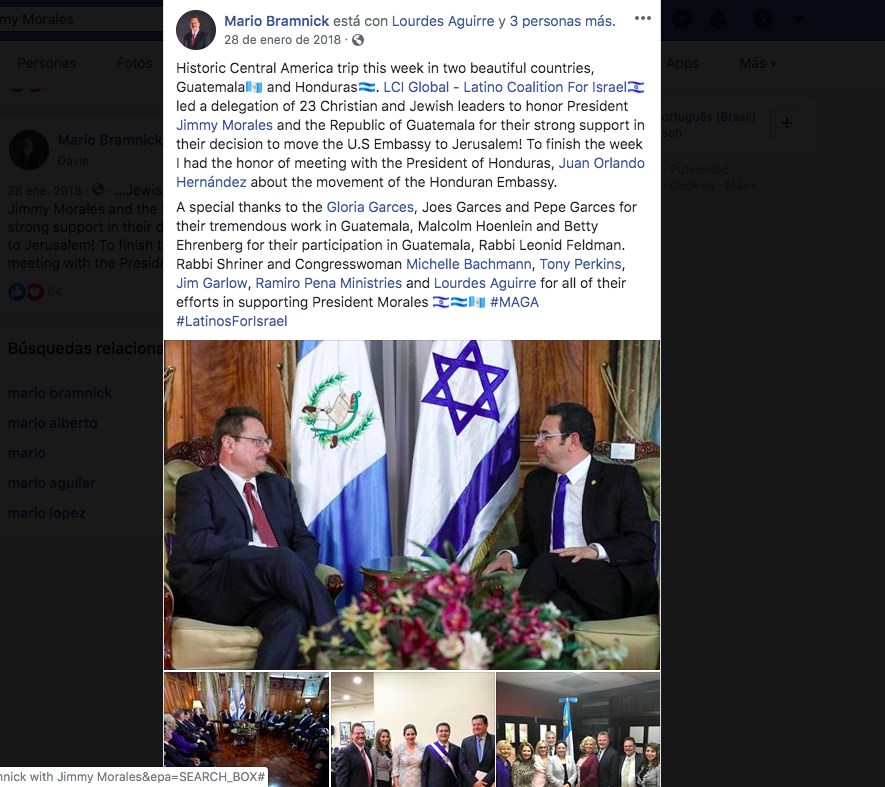
Exactly a year after he was honored by the evangelical leaders, Morales ended the International Commission against Impunity in Guatemala (CICIG), a body of the United Nations that grew out of a 2006 agreement to end illegal security bodies and other entities that commit felonies and violate human rights. The mandate of the CICIG, which had dismantled many criminal structures linked to the highest spheres of power, was extended numerous times, the last time at the request of Morales himself in September 2017.
But by January 2019, the Guatemalan president had reconsidered. He gave all personnel of the Commission still in the country 24 hours to leave.
Starting in August, Morales declared persona-non-grata the Colombian commissioner Iván Velázquez, who continues to direct the CICIG from abroad and prepared its final closure in September. Morales announced his decision on television surrounded by military, while military jeeps encircled the headquarters of the CICIG in Guatemala City.
The CICIG had investigated president Morales for illegal campaign financing. It had also opened investigations into claims that his son and brother defrauded the state by creating and paying non-existent employees in the General Property Registry.
In August 2017, the Guatemalan Attorney General’s Office and the CICIG, concluded their first investigation against Morales and his party for alleged illicit campaign financing. In total, prosecutors estimated that Morales and his party did not declare Q15 million -US $2 million- in campaign donations.
On August 25, they presented Congress with their first of several petitions to remove the president’s shield of immunity against criminal prosecution –so they could subpoena him and continue digging into his direct involvement in the alleged crimes. The probes were archived in October last year after Guatemalan Congress voted three times to keep Morales immunity intact. The President repeated his campaign slogan every time he was asked about the investigations: I’m “neither corrupt nor a thief.”
The administration of former US President Barack Obama, and prior administrations, had given unconditional support to the CICIG and had defended it when under attack. The Trump administration began by guaranteeing its full support, but gradually adopted a lower profile and a line matching that of Morales, supporting a “reformed” CICIG.
In July 2018, Maclatchy published a story quoting a “direct source” that had knowledge of the conversations about the CICIG in Washington DC: “The only reason why the US is all about it (withdrawing support from the CICIG) is because they’re so happy with Guatemala that they moved the embassy to Jerusalem. Just because the President (Morales) is upset that the CICIG is investigating some of his family members then he makes a decision to do the whole thing in Israel to get in front of the Trump administration and then tell Trump: ‘help me on CICIG.’ ”
The account was not confirmed nor debunked by the White House or the State Department.
CJI, CLIP and journalistic partners Nómada and Plaza Pública in Guatemala interviewed two sources with access to the Guatemalan government who corroborated the information in the Maclatchy story. According to both sources, President Morales saw a perfect opportunity for expelling the CICIG from Guatemala with American support in exchange for moving the Guatemalan embassy in Israel.
After the trip to Guatemala, five leaders of the White House Faith Initiative met with the Honduran president during his visit to Washington in June 2018. In that meeting, Bramnick explained, “we asked the President how we could help him in making his decision about the embassy and we met with him twice again in the following months”.
Apart from Bramnick, one other leader of the Faith Initiative has had an important role in meeting with politicians in Latin America. Michele Bachmann, a former US congresswoman and founder of the Tea Party Caucus in the House of Representatives, is one the most active members of the Faith Initiative and one of two women in the mostly male group.
She is also well-connected. She is on the managing board of Capitol Ministries and directs a ministry in the United Nations in New York that she uses to evangelize world leaders and promote an Old Testament understanding of Israel.
In August 19th last year, two months before elections in Brazil, Bachmann recorded a video in English encouraging Brazilians to vote for a candidate willing to relocate the Brazilian embassy to Jerusalem. Bolsonaro promised to do it during his campaign. Bachmann did not mentioned Bolsonaro’s name and identified herself as a former Congresswoman and former US presidential candidate.
“For 3.500 years God has designated Jerusalem as Israel’s capital. It’s a fact,” Bachman said in the video “We want Brazil to be blessed, we want Brazil to prosper, therefore make sure when you vote you only vote for a candidate who will move the Brazilian embassy to Jerusalem.”
Days earlier, Bachmann and Mario Bramnick had participated in the celebration of the 70th anniversary of the creation of the State of Israel in a mega church in Belo Horizonte, Brazil. Without mentioning Bolsonaro by name, Bramnick again asked worshippers to vote for the candidate who would move the embassy to Jerusalem.
President Bolsonaro’s son Eduardo Bolsonaro attended this celebration, which became a campaign event of sorts, according to reporting by Agencia Publica, the Brazilian partner to this investigation. Brazilian legislation prohibits religious people to campaign in elections. It also prohibits foreigners to get involved in the electoral process. However, Bramnick and Bachmann didn’t explicitly mention Bolsonaro’s name in their public messages.
As Jane Silva, the pastor who organized the celebration, told Agência Publica, Bolsonaro’s former campaign treasurer contributed to the event. The church that led the religious celebration is the church to which Brazilian minister of Human Rights and Women, Damares Alves, goes to. Minister Alves has said that women should dress in pink and men in blue.
Bramnick returned to Brazil in December together with another delegation from the White House Faith and Opportunity Initiative. There, he met again with Eduardo Bolsonaro who is also congressman and was recently announced as the next Brazilian ambassador to the US.
“Eduardo Bolsonaro invited me to bring a smaller delegation to Rio de Janeiro to speak to his dad, President Bolsonaro, about relocating the embassy,” Bramnick remembered. The pastor also attended the inauguration of the Brazilian President.
In March 2018, the Brazilian president stopped short of moving his country’s embassy in Israel, as he had promised, announcing that he would relocate a business office to Jerusalem instead. “He is still open to move the embassy. Obviously, it wasn’t an easy decision at all,” said Bramnick.
Eduardo Bolsonaro had also promised pastor Jane Silva that his father would relocate the Brazilian embassy to Jerusalem. Silva said that she talked about this with Jared Kushner in November 2018. Silva said to the press that Trump’s son-in-law would help to plan the relocation.
President Bolsonaro, who recently had his country’s armed forces celebrate the anniversary of the start of military dictatorship that ruled the country for 21 years, did not respond to questions for this article sent by CJI on July 31.
The diplomatic moves by the leaders of the Faith Initiative have become more strategic. Last May, Bramnick met with Salvadoran President Nayib Bukele before he took office.
“We are going back to El Salvador to meet again with President Bukele and launch a gathering of pastors in the country, and then we will travel to Honduras to honor President Hernández for his decision of moving the diplomatic office,” announced the pastor, who also included Costa Rica in the tour. (Please see El Faro’s story that describes the meeting they had on July 23rd).
Asked how he manages to have access to so many world leaders, Bramnick explained that the group’s connections varied from country to country. “If it’s not someone in government, it is a pastor with connections or a congressman, or a congressman’s adviser,” he said.
He noted that the approach varies from leader to leader.
“If they are Christian and understand the spiritual field, we speak to them in one way and if not, we talk to them about some of the issues most important to us,” he said. “Currently, there is a project involving Israel, the US and Arab countries, of providing financial support for Palestinians by bringing money and business, but excluding the Palestinian Authority, which is corrupt.”
The pastor refers to the United States’s Peace to Prosperity plan for the Middle East presented in Bahrain in June and promoted by Jared Kushner, Trump’s son-in-law and advisor on Middle Eastern affairs. The plan, which Trump called “the deal of the century”, makes no mention of the creation of a Palestinian state and focuses on raising $50 billion for development projects in Gaza.
Bramnick explained that faith leaders meet with business leaders and investors to promote Kushner’s plan. “We brief the presidents on what is currently happening and we tell them it’s not just about blessing Israel and the Jews, like the Bible says, but also Arabs and the sons of Israel, through projects that are already being carried out”.
This joint investigation found that the leaders of the White House Faith and Opportunity Initiative travel in groups to exert influence not only with Latin American presidents. Between December 2017 and late 2018, many members have had access to world leaders close to the Trump administration. They include Saudi Crown Prince Mohammad bin Salman, whom they visited a month after the murder of journalist Jamal Ahmad Khashoggi to discuss religious freedom. Last June 19th, the United Nations published a report by the Special Rapporteur on Extrajudicial, Summary or Arbitrary Executions who concluded that “there is credible evidence warranting further investigation of high-level officials currently not being criminally charged, specifically Saud Alqahtani, and the Crown Prince Mohammed bin Salman. No conclusion is made as to guilt.”
They have also discussed Middle East matters with Abu Dhabi Crown Prince Mohammed bin Zayed Al Nahyan and King Abdullah II of Jordan.
Netanyahu, the Israeli prime minister, who also faces a corruption investigation, is one of the main beneficiaries of the work of this group of evangelicals. He has met them to coordinate which evangelical countries to influence next in order to get them behind his agenda for controlling Jerusalem, according to multiple testimonies from the White House Faith Initiative leaders.
Last March, according to the Israeli newspaper Haaretz, Netanyahu told one of his advisers: “We don’t need AIPAC anymore,” referring to the influential American Israel Public Affairs Committee. “We have enough support in the United States from the evangelicals”. AIPAC invests millions of dollars on lobbying in favor of Israel in the United States.
Trump, Netanyahu, Bolsonaro and the Latin American presidents who are negotiating electoral and political support with Christian groups are not a new class of players in global politics.
Nevertheless, the story documented by this journalistic collaboration brings to light that while they defend Christian morality, they publicly announce their friendship with governments whose morality has been seriously questioned.
Credits: This article is part of the project Faith Transnationals, a collaboration of 16 media outlets under the investigative leadership of Columbia Journalism Investigation and the School of Journalism of Columbia University (United States), the Latin American Center for Investigative Journalism (CLIP), and their journalistic allies: Univisión (United States), Agencia Pública (Brazil); El País (Uruguay); CIPER (Chile); El Surtidor (Paraguay); La República (Perú); Armado.info (Venezuela); El Tiempo (Colombia); La Voz de Guanacaste and Semanario Universidad (Costa Rica); El Faro (El Salvador); Nómada and Plaza Pública (Guatemala); Contracorriente (Honduras); El País (Uruguay); and Mexicanos Contra la Corrupción and La Impunidad (Mexico).


